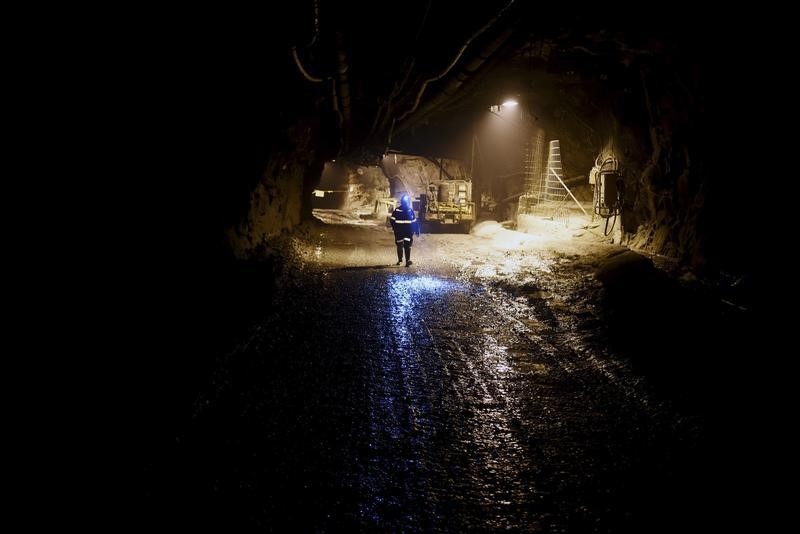* Job cuts hit Zambia, S.Africa, Congo ahead of elections
* Zambia threatens to revoke Chinese firm's mining licence
* Governments, companies in talks to prevent retrenchments
By Olivia Kumwenda-Mtambo
JOHANNESBURG, Sept 18 (Reuters) - When Canada's Barrick Gold
ABX.TO said it would close its copper mine in Zambia if the
government imposed a sharp hike in mineral royalties, President
Edgar Lungu had little choice but to back down to save valuable
jobs that keep the country going.
Mining accounts for over 70 percent of export earnings and
employs over 60,000 in the landlocked southern African economy.
With his Patriotic Front(PF) facing an election next year,
Lungu, promised no jobs would be lost and agreed to lower
royalties than the government wanted.
Barrick kept the jobs and the mine open in a case that
highlighted the challenges for African governments in dealing
with powerful international miners suffering from a global
commodities slump. Governments in South Africa and the
Democratic Republic of Congo (DRC) are also grappling with
thousands of mining job cuts ahead of elections.
Investors in Zambia are now watching the government's
reaction to plans by Glencore 's GLEN.L Zambian unit, Mopani
Copper Mines (MCM), to axe 4,300 workers, a decision by China's
CNMC Luanshya Copper Mines to put 1,600 staff at its Baluba
operation on forced leave, and the decision by Konkola Copper
Mines (KCM), owned by Vedanta Resources Plc VED.L , to put 133
employees on forced paid leave.
"This is giving the ruling party sleepless nights," said Lee
Habasonda, a political analyst at the University of Zambia.
"The Patriotic Front has heavily relied on votes from the
Copperbelt and if this situation is not handled carefully, it
could just spell doom for the ruling party."
CNMC said its mine would have collapsed within three months
if the company had not suspended production and that it followed
Zambian law when it closed the mine.
But a government spokesman said on Sunday Zambia would
revoke CNMC's licence if it does not send its workers back, a
drastic move that would have long-term repercussions for foreign
investment.
Finance Minister Alexander Chikwanda on Wednesday struck a
more sober tone, saying there was no need for drastic action.
"Mining companies are private investors, we can appeal to
them but I don't think we have to take draconian measures," he
told Reuters.
Mines minister Christopher Yaluma said the government would
talk to Mopani, which is the second largest employer in Zambia
after the state with about 21,000 direct and contract workers.
But analysts fear, with elections looming and Lungu only
elected in January in a ballot triggered by the death of Michael
Sata, Zambia could take drastic measures if the firms press
ahead with retrenchments.
"The socially-oriented government is aware that 2016 is
another election year and that voting citizens have received the
back end of the stick in recent months," said Irmgard Erasmus,
an analyst at NKC African Economics in Cape Town.
"While having indicated that the business climate will be
more accommodative under the Lungu administration, the
government's stance suggests that, when push comes to shove,
little to none has changed in Zambia."
In 2013, the Sata-led government forced KCM to reverse a
plan to lay off 1,500 workers after the government threatened to
revoke the company's license, a row that tarnished the image of
one of Africa's most promising frontier markets.
VERY SENSITIVE
The problems in Zambia are replicated in other parts of
Africa as global miners adjust their operations to take into
account a slump in the industry.
In South Africa, mining contributes around 7 percent to the
economy and employs about 500,000 people.
But mining firms including Glencore , Anglo American (LONDON:AAL) Platinum
AMSJ.J and Lonmin LMI.L plan to cut thousands of jobs there
as they battle falling prices and rising costs.
The government has said almost 12,000 mining jobs were on
the line this year- retrenchments that will do little to help
President Jacob Zuma's efforts to trim an unemployment rate of
25 percent in the run-up to municipal elections next year.
South Africa's mines minister last month briefly suspended
operations at Glencore's Optimum coal mine over the job cuts.
A plan by the government and mining companies to prevent job
losses is seen doing little to stem layoffs as it does not
include a total freeze on job cuts.
"Retrenchments are very sensitive from the government
perspective. You don't want to rock the boat by letting so many
people lose their jobs before an important election," said Henk
De Hoop, a mining analyst at Rand Merchant Bank.
"But behind the scenes, realism is expected to set in
because you equally don't want to scare away investors."
DRC, the continent's biggest copper producer, is also due to
hold general elections in 2016.
Congolese miner Kamoto Copper Company (KCC), controlled by
Glencore, plans to suspend production due to weak commodity
prices and says it will keep only 80 percent of its existing
workforce during the shutdown.
The shutdown was expected to impact the economy.
"There are transport companies who work with KCC to
transport copper to the Zambian border and beyond. Those people
will automatically have problems," said one prime ministerial
adviser who did not want to be named.
The Congolese government met a Glencore delegation last week
and KCC said it would take into account the issues raised by the
government, without elaborating.
